NUR2300: Comparing Bariatric Surgery and Medical Therapy for Diabetes
VerifiedAdded on 2023/06/03
|9
|2526
|384
Report
AI Summary
This report systematically reviews the effectiveness of bariatric surgery compared to conventional medical therapy for diabetes remission, addressing the research question: "Is bariatric surgery more effective in increasing the probability of remission of diabetes than conventional medical therapy in patients diagnosed with Diabetes?" The analysis evaluates research methodologies, ethical considerations, and findings from studies comparing these two approaches. It highlights the potential benefits of bariatric surgery in achieving better glucose control and reducing weight, while also acknowledging potential long-term outcomes and side effects. The review includes a literature review of key studies, such as those by Mingrone et al. and Schauer et al., and recommends future research to explore the long-term effects of bariatric surgery. Ultimately, the report aims to inform patients and medical specialists in making informed decisions about diabetes treatment, with the understanding that Desklib provides a platform for accessing similar academic resources.
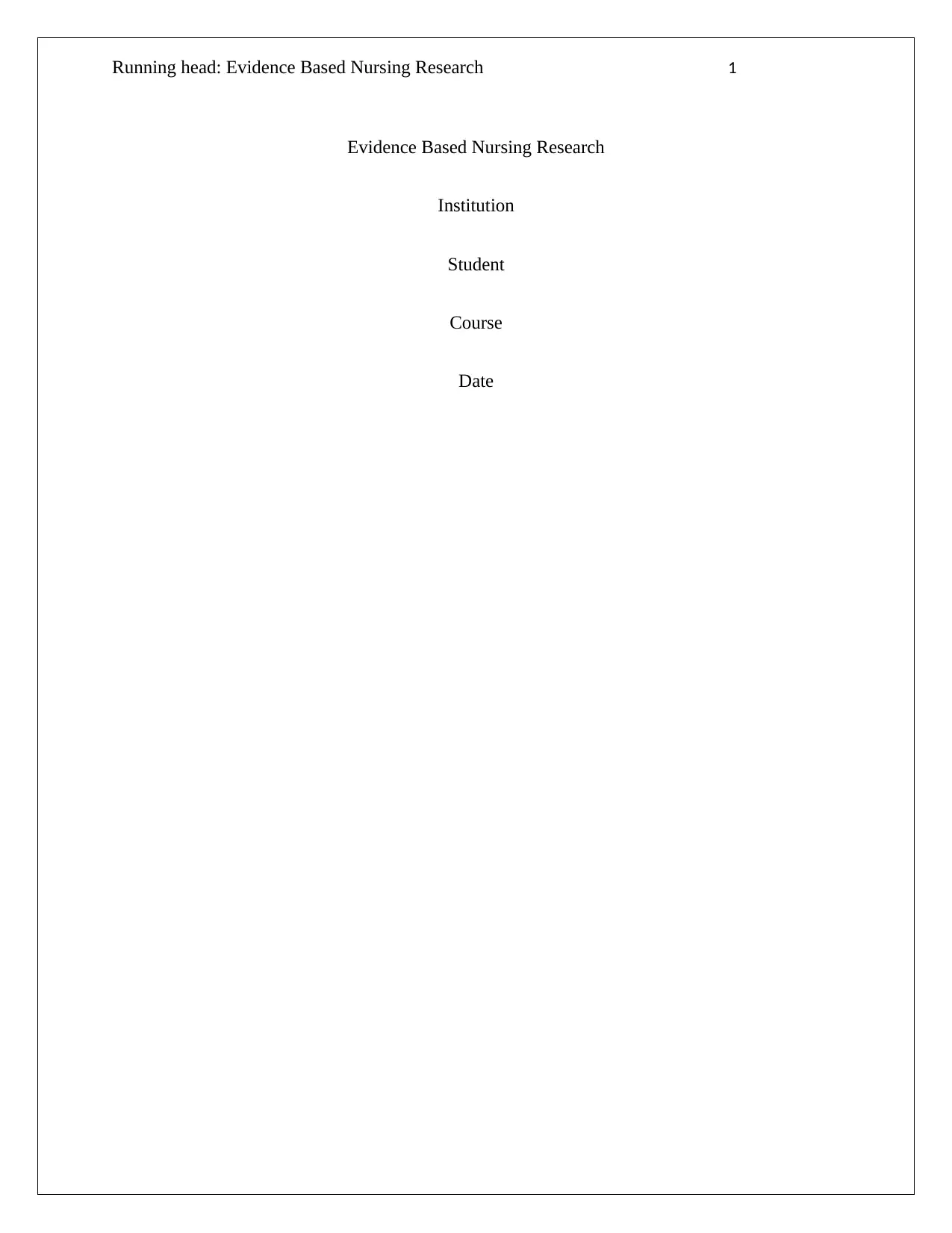
Running head: Evidence Based Nursing Research 1
Evidence Based Nursing Research
Institution
Student
Course
Date
Evidence Based Nursing Research
Institution
Student
Course
Date
Paraphrase This Document
Need a fresh take? Get an instant paraphrase of this document with our AI Paraphraser
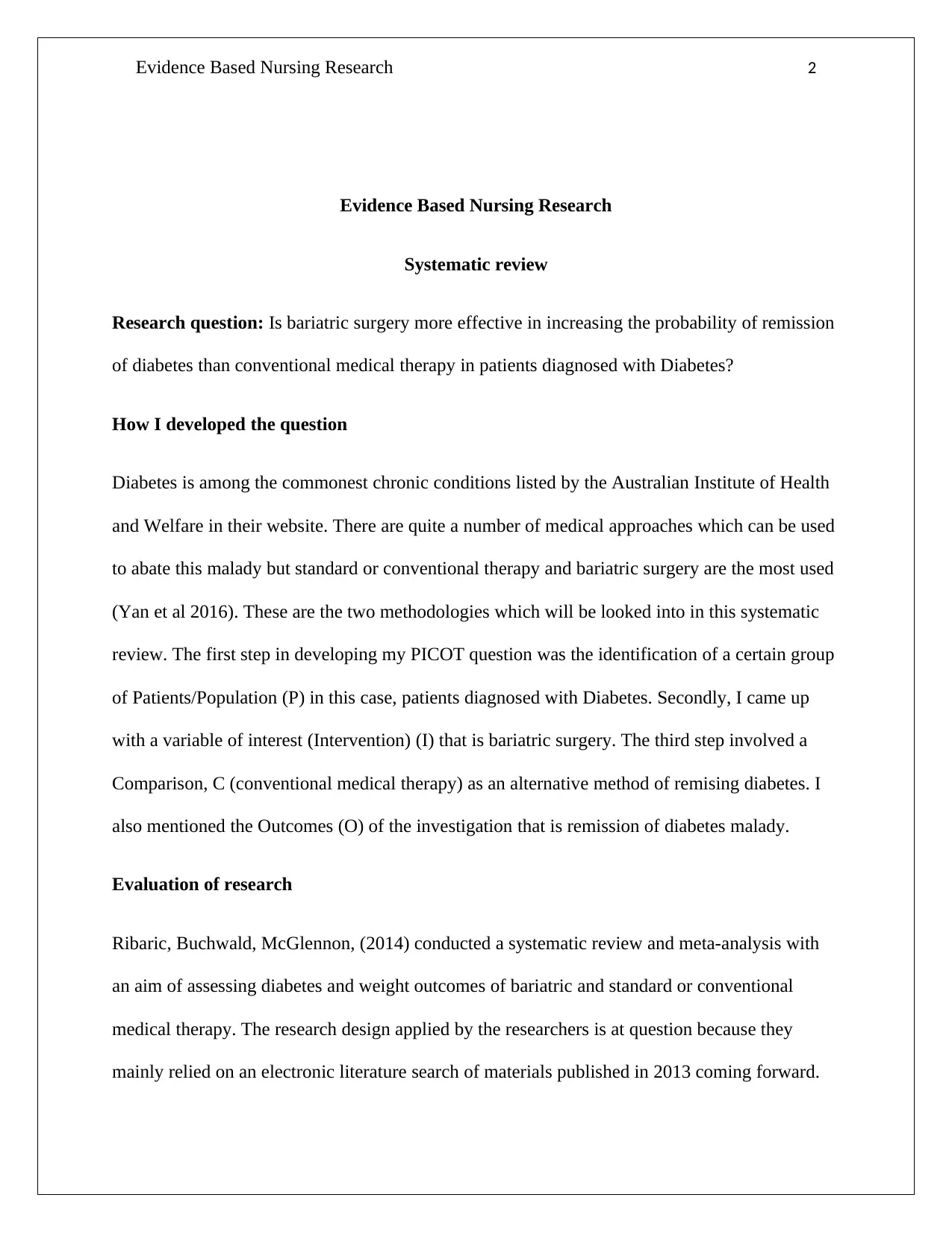
Evidence Based Nursing Research 2
Evidence Based Nursing Research
Systematic review
Research question: Is bariatric surgery more effective in increasing the probability of remission
of diabetes than conventional medical therapy in patients diagnosed with Diabetes?
How I developed the question
Diabetes is among the commonest chronic conditions listed by the Australian Institute of Health
and Welfare in their website. There are quite a number of medical approaches which can be used
to abate this malady but standard or conventional therapy and bariatric surgery are the most used
(Yan et al 2016). These are the two methodologies which will be looked into in this systematic
review. The first step in developing my PICOT question was the identification of a certain group
of Patients/Population (P) in this case, patients diagnosed with Diabetes. Secondly, I came up
with a variable of interest (Intervention) (I) that is bariatric surgery. The third step involved a
Comparison, C (conventional medical therapy) as an alternative method of remising diabetes. I
also mentioned the Outcomes (O) of the investigation that is remission of diabetes malady.
Evaluation of research
Ribaric, Buchwald, McGlennon, (2014) conducted a systematic review and meta-analysis with
an aim of assessing diabetes and weight outcomes of bariatric and standard or conventional
medical therapy. The research design applied by the researchers is at question because they
mainly relied on an electronic literature search of materials published in 2013 coming forward.
Evidence Based Nursing Research
Systematic review
Research question: Is bariatric surgery more effective in increasing the probability of remission
of diabetes than conventional medical therapy in patients diagnosed with Diabetes?
How I developed the question
Diabetes is among the commonest chronic conditions listed by the Australian Institute of Health
and Welfare in their website. There are quite a number of medical approaches which can be used
to abate this malady but standard or conventional therapy and bariatric surgery are the most used
(Yan et al 2016). These are the two methodologies which will be looked into in this systematic
review. The first step in developing my PICOT question was the identification of a certain group
of Patients/Population (P) in this case, patients diagnosed with Diabetes. Secondly, I came up
with a variable of interest (Intervention) (I) that is bariatric surgery. The third step involved a
Comparison, C (conventional medical therapy) as an alternative method of remising diabetes. I
also mentioned the Outcomes (O) of the investigation that is remission of diabetes malady.
Evaluation of research
Ribaric, Buchwald, McGlennon, (2014) conducted a systematic review and meta-analysis with
an aim of assessing diabetes and weight outcomes of bariatric and standard or conventional
medical therapy. The research design applied by the researchers is at question because they
mainly relied on an electronic literature search of materials published in 2013 coming forward.
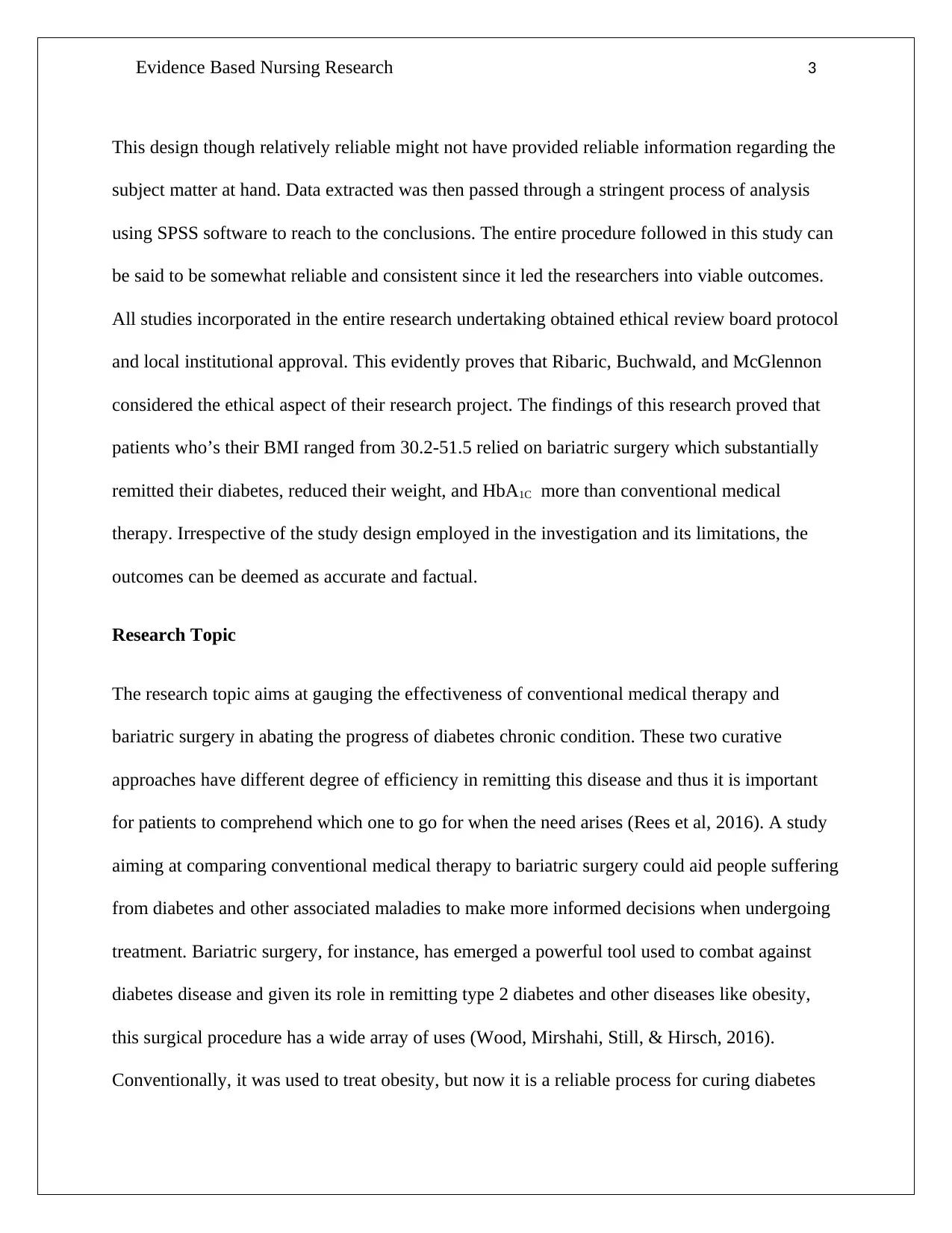
Evidence Based Nursing Research 3
This design though relatively reliable might not have provided reliable information regarding the
subject matter at hand. Data extracted was then passed through a stringent process of analysis
using SPSS software to reach to the conclusions. The entire procedure followed in this study can
be said to be somewhat reliable and consistent since it led the researchers into viable outcomes.
All studies incorporated in the entire research undertaking obtained ethical review board protocol
and local institutional approval. This evidently proves that Ribaric, Buchwald, and McGlennon
considered the ethical aspect of their research project. The findings of this research proved that
patients who’s their BMI ranged from 30.2-51.5 relied on bariatric surgery which substantially
remitted their diabetes, reduced their weight, and HbA1C more than conventional medical
therapy. Irrespective of the study design employed in the investigation and its limitations, the
outcomes can be deemed as accurate and factual.
Research Topic
The research topic aims at gauging the effectiveness of conventional medical therapy and
bariatric surgery in abating the progress of diabetes chronic condition. These two curative
approaches have different degree of efficiency in remitting this disease and thus it is important
for patients to comprehend which one to go for when the need arises (Rees et al, 2016). A study
aiming at comparing conventional medical therapy to bariatric surgery could aid people suffering
from diabetes and other associated maladies to make more informed decisions when undergoing
treatment. Bariatric surgery, for instance, has emerged a powerful tool used to combat against
diabetes disease and given its role in remitting type 2 diabetes and other diseases like obesity,
this surgical procedure has a wide array of uses (Wood, Mirshahi, Still, & Hirsch, 2016).
Conventionally, it was used to treat obesity, but now it is a reliable process for curing diabetes
This design though relatively reliable might not have provided reliable information regarding the
subject matter at hand. Data extracted was then passed through a stringent process of analysis
using SPSS software to reach to the conclusions. The entire procedure followed in this study can
be said to be somewhat reliable and consistent since it led the researchers into viable outcomes.
All studies incorporated in the entire research undertaking obtained ethical review board protocol
and local institutional approval. This evidently proves that Ribaric, Buchwald, and McGlennon
considered the ethical aspect of their research project. The findings of this research proved that
patients who’s their BMI ranged from 30.2-51.5 relied on bariatric surgery which substantially
remitted their diabetes, reduced their weight, and HbA1C more than conventional medical
therapy. Irrespective of the study design employed in the investigation and its limitations, the
outcomes can be deemed as accurate and factual.
Research Topic
The research topic aims at gauging the effectiveness of conventional medical therapy and
bariatric surgery in abating the progress of diabetes chronic condition. These two curative
approaches have different degree of efficiency in remitting this disease and thus it is important
for patients to comprehend which one to go for when the need arises (Rees et al, 2016). A study
aiming at comparing conventional medical therapy to bariatric surgery could aid people suffering
from diabetes and other associated maladies to make more informed decisions when undergoing
treatment. Bariatric surgery, for instance, has emerged a powerful tool used to combat against
diabetes disease and given its role in remitting type 2 diabetes and other diseases like obesity,
this surgical procedure has a wide array of uses (Wood, Mirshahi, Still, & Hirsch, 2016).
Conventionally, it was used to treat obesity, but now it is a reliable process for curing diabetes
⊘ This is a preview!⊘
Do you want full access?
Subscribe today to unlock all pages.

Trusted by 1+ million students worldwide
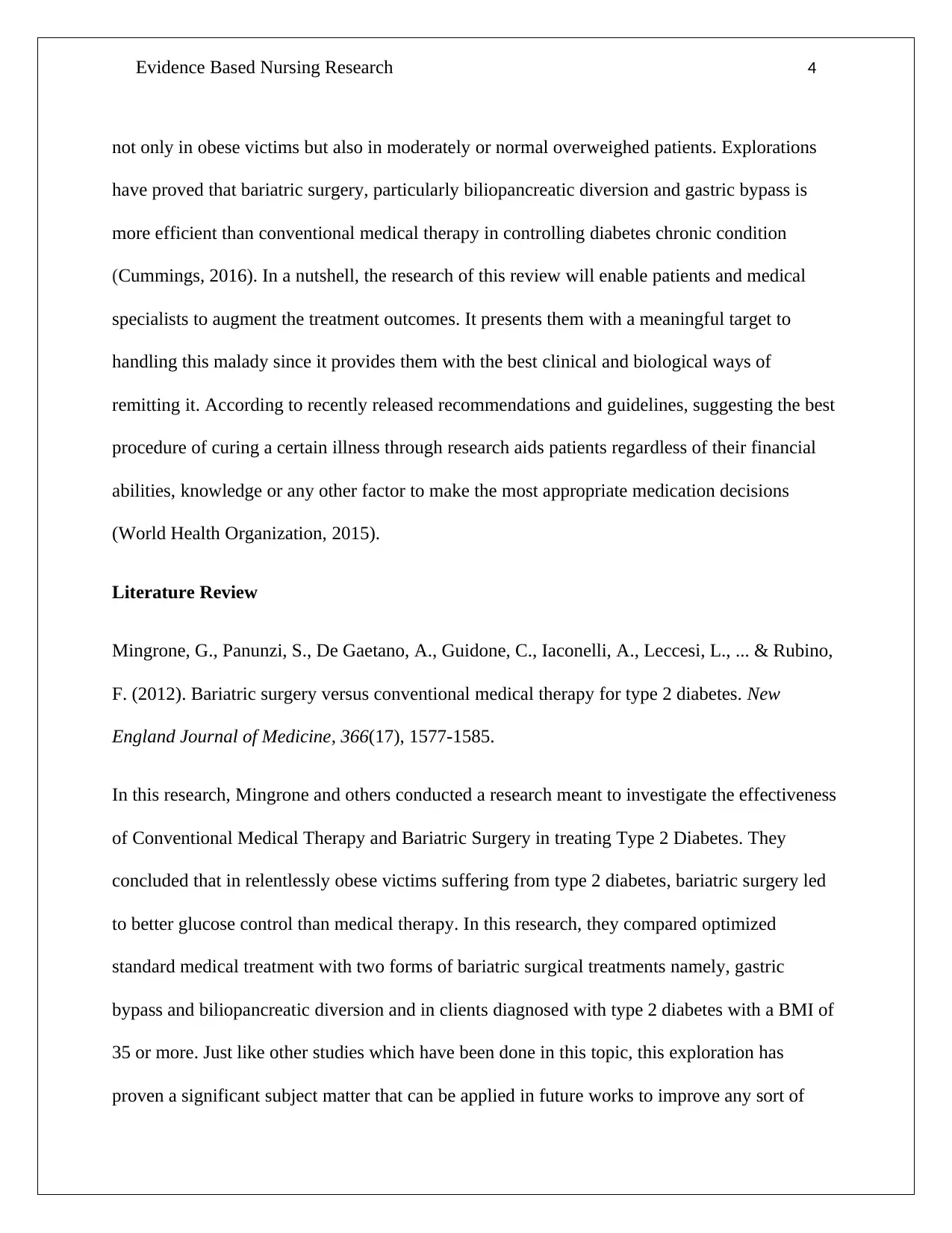
Evidence Based Nursing Research 4
not only in obese victims but also in moderately or normal overweighed patients. Explorations
have proved that bariatric surgery, particularly biliopancreatic diversion and gastric bypass is
more efficient than conventional medical therapy in controlling diabetes chronic condition
(Cummings, 2016). In a nutshell, the research of this review will enable patients and medical
specialists to augment the treatment outcomes. It presents them with a meaningful target to
handling this malady since it provides them with the best clinical and biological ways of
remitting it. According to recently released recommendations and guidelines, suggesting the best
procedure of curing a certain illness through research aids patients regardless of their financial
abilities, knowledge or any other factor to make the most appropriate medication decisions
(World Health Organization, 2015).
Literature Review
Mingrone, G., Panunzi, S., De Gaetano, A., Guidone, C., Iaconelli, A., Leccesi, L., ... & Rubino,
F. (2012). Bariatric surgery versus conventional medical therapy for type 2 diabetes. New
England Journal of Medicine, 366(17), 1577-1585.
In this research, Mingrone and others conducted a research meant to investigate the effectiveness
of Conventional Medical Therapy and Bariatric Surgery in treating Type 2 Diabetes. They
concluded that in relentlessly obese victims suffering from type 2 diabetes, bariatric surgery led
to better glucose control than medical therapy. In this research, they compared optimized
standard medical treatment with two forms of bariatric surgical treatments namely, gastric
bypass and biliopancreatic diversion and in clients diagnosed with type 2 diabetes with a BMI of
35 or more. Just like other studies which have been done in this topic, this exploration has
proven a significant subject matter that can be applied in future works to improve any sort of
not only in obese victims but also in moderately or normal overweighed patients. Explorations
have proved that bariatric surgery, particularly biliopancreatic diversion and gastric bypass is
more efficient than conventional medical therapy in controlling diabetes chronic condition
(Cummings, 2016). In a nutshell, the research of this review will enable patients and medical
specialists to augment the treatment outcomes. It presents them with a meaningful target to
handling this malady since it provides them with the best clinical and biological ways of
remitting it. According to recently released recommendations and guidelines, suggesting the best
procedure of curing a certain illness through research aids patients regardless of their financial
abilities, knowledge or any other factor to make the most appropriate medication decisions
(World Health Organization, 2015).
Literature Review
Mingrone, G., Panunzi, S., De Gaetano, A., Guidone, C., Iaconelli, A., Leccesi, L., ... & Rubino,
F. (2012). Bariatric surgery versus conventional medical therapy for type 2 diabetes. New
England Journal of Medicine, 366(17), 1577-1585.
In this research, Mingrone and others conducted a research meant to investigate the effectiveness
of Conventional Medical Therapy and Bariatric Surgery in treating Type 2 Diabetes. They
concluded that in relentlessly obese victims suffering from type 2 diabetes, bariatric surgery led
to better glucose control than medical therapy. In this research, they compared optimized
standard medical treatment with two forms of bariatric surgical treatments namely, gastric
bypass and biliopancreatic diversion and in clients diagnosed with type 2 diabetes with a BMI of
35 or more. Just like other studies which have been done in this topic, this exploration has
proven a significant subject matter that can be applied in future works to improve any sort of
Paraphrase This Document
Need a fresh take? Get an instant paraphrase of this document with our AI Paraphraser
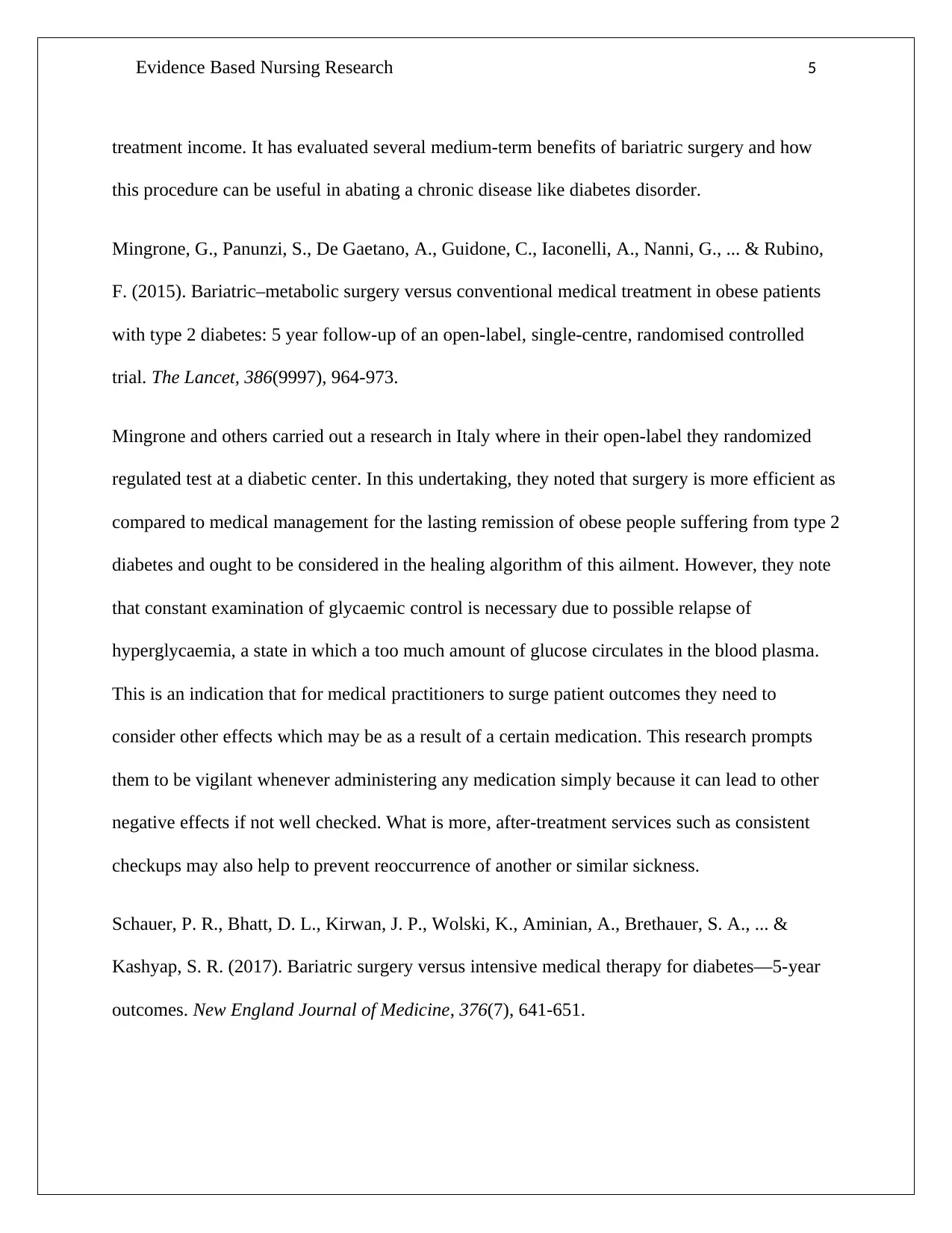
Evidence Based Nursing Research 5
treatment income. It has evaluated several medium-term benefits of bariatric surgery and how
this procedure can be useful in abating a chronic disease like diabetes disorder.
Mingrone, G., Panunzi, S., De Gaetano, A., Guidone, C., Iaconelli, A., Nanni, G., ... & Rubino,
F. (2015). Bariatric–metabolic surgery versus conventional medical treatment in obese patients
with type 2 diabetes: 5 year follow-up of an open-label, single-centre, randomised controlled
trial. The Lancet, 386(9997), 964-973.
Mingrone and others carried out a research in Italy where in their open-label they randomized
regulated test at a diabetic center. In this undertaking, they noted that surgery is more efficient as
compared to medical management for the lasting remission of obese people suffering from type 2
diabetes and ought to be considered in the healing algorithm of this ailment. However, they note
that constant examination of glycaemic control is necessary due to possible relapse of
hyperglycaemia, a state in which a too much amount of glucose circulates in the blood plasma.
This is an indication that for medical practitioners to surge patient outcomes they need to
consider other effects which may be as a result of a certain medication. This research prompts
them to be vigilant whenever administering any medication simply because it can lead to other
negative effects if not well checked. What is more, after-treatment services such as consistent
checkups may also help to prevent reoccurrence of another or similar sickness.
Schauer, P. R., Bhatt, D. L., Kirwan, J. P., Wolski, K., Aminian, A., Brethauer, S. A., ... &
Kashyap, S. R. (2017). Bariatric surgery versus intensive medical therapy for diabetes—5-year
outcomes. New England Journal of Medicine, 376(7), 641-651.
treatment income. It has evaluated several medium-term benefits of bariatric surgery and how
this procedure can be useful in abating a chronic disease like diabetes disorder.
Mingrone, G., Panunzi, S., De Gaetano, A., Guidone, C., Iaconelli, A., Nanni, G., ... & Rubino,
F. (2015). Bariatric–metabolic surgery versus conventional medical treatment in obese patients
with type 2 diabetes: 5 year follow-up of an open-label, single-centre, randomised controlled
trial. The Lancet, 386(9997), 964-973.
Mingrone and others carried out a research in Italy where in their open-label they randomized
regulated test at a diabetic center. In this undertaking, they noted that surgery is more efficient as
compared to medical management for the lasting remission of obese people suffering from type 2
diabetes and ought to be considered in the healing algorithm of this ailment. However, they note
that constant examination of glycaemic control is necessary due to possible relapse of
hyperglycaemia, a state in which a too much amount of glucose circulates in the blood plasma.
This is an indication that for medical practitioners to surge patient outcomes they need to
consider other effects which may be as a result of a certain medication. This research prompts
them to be vigilant whenever administering any medication simply because it can lead to other
negative effects if not well checked. What is more, after-treatment services such as consistent
checkups may also help to prevent reoccurrence of another or similar sickness.
Schauer, P. R., Bhatt, D. L., Kirwan, J. P., Wolski, K., Aminian, A., Brethauer, S. A., ... &
Kashyap, S. R. (2017). Bariatric surgery versus intensive medical therapy for diabetes—5-year
outcomes. New England Journal of Medicine, 376(7), 641-651.
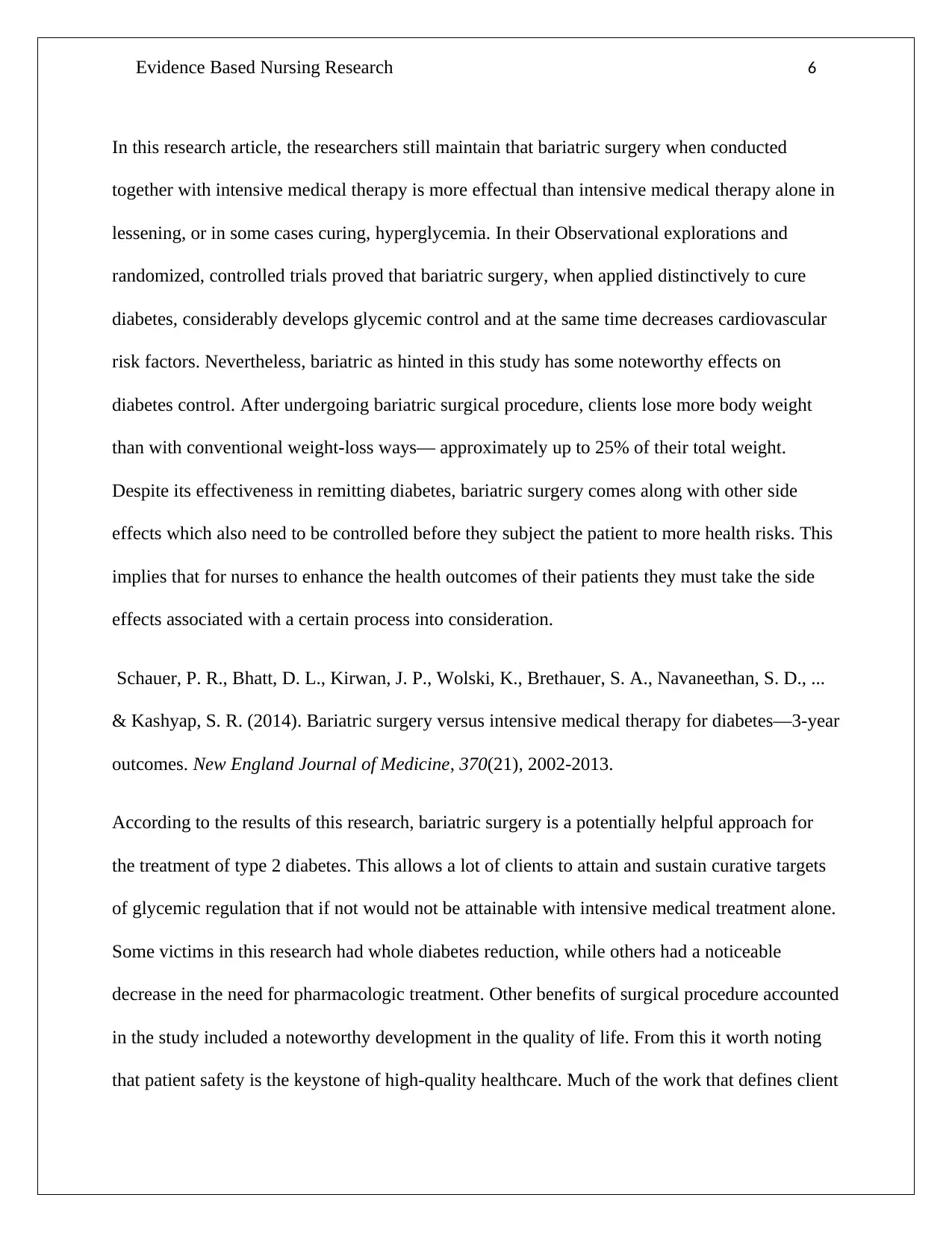
Evidence Based Nursing Research 6
In this research article, the researchers still maintain that bariatric surgery when conducted
together with intensive medical therapy is more effectual than intensive medical therapy alone in
lessening, or in some cases curing, hyperglycemia. In their Observational explorations and
randomized, controlled trials proved that bariatric surgery, when applied distinctively to cure
diabetes, considerably develops glycemic control and at the same time decreases cardiovascular
risk factors. Nevertheless, bariatric as hinted in this study has some noteworthy effects on
diabetes control. After undergoing bariatric surgical procedure, clients lose more body weight
than with conventional weight-loss ways— approximately up to 25% of their total weight.
Despite its effectiveness in remitting diabetes, bariatric surgery comes along with other side
effects which also need to be controlled before they subject the patient to more health risks. This
implies that for nurses to enhance the health outcomes of their patients they must take the side
effects associated with a certain process into consideration.
Schauer, P. R., Bhatt, D. L., Kirwan, J. P., Wolski, K., Brethauer, S. A., Navaneethan, S. D., ...
& Kashyap, S. R. (2014). Bariatric surgery versus intensive medical therapy for diabetes—3-year
outcomes. New England Journal of Medicine, 370(21), 2002-2013.
According to the results of this research, bariatric surgery is a potentially helpful approach for
the treatment of type 2 diabetes. This allows a lot of clients to attain and sustain curative targets
of glycemic regulation that if not would not be attainable with intensive medical treatment alone.
Some victims in this research had whole diabetes reduction, while others had a noticeable
decrease in the need for pharmacologic treatment. Other benefits of surgical procedure accounted
in the study included a noteworthy development in the quality of life. From this it worth noting
that patient safety is the keystone of high-quality healthcare. Much of the work that defines client
In this research article, the researchers still maintain that bariatric surgery when conducted
together with intensive medical therapy is more effectual than intensive medical therapy alone in
lessening, or in some cases curing, hyperglycemia. In their Observational explorations and
randomized, controlled trials proved that bariatric surgery, when applied distinctively to cure
diabetes, considerably develops glycemic control and at the same time decreases cardiovascular
risk factors. Nevertheless, bariatric as hinted in this study has some noteworthy effects on
diabetes control. After undergoing bariatric surgical procedure, clients lose more body weight
than with conventional weight-loss ways— approximately up to 25% of their total weight.
Despite its effectiveness in remitting diabetes, bariatric surgery comes along with other side
effects which also need to be controlled before they subject the patient to more health risks. This
implies that for nurses to enhance the health outcomes of their patients they must take the side
effects associated with a certain process into consideration.
Schauer, P. R., Bhatt, D. L., Kirwan, J. P., Wolski, K., Brethauer, S. A., Navaneethan, S. D., ...
& Kashyap, S. R. (2014). Bariatric surgery versus intensive medical therapy for diabetes—3-year
outcomes. New England Journal of Medicine, 370(21), 2002-2013.
According to the results of this research, bariatric surgery is a potentially helpful approach for
the treatment of type 2 diabetes. This allows a lot of clients to attain and sustain curative targets
of glycemic regulation that if not would not be attainable with intensive medical treatment alone.
Some victims in this research had whole diabetes reduction, while others had a noticeable
decrease in the need for pharmacologic treatment. Other benefits of surgical procedure accounted
in the study included a noteworthy development in the quality of life. From this it worth noting
that patient safety is the keystone of high-quality healthcare. Much of the work that defines client
⊘ This is a preview!⊘
Do you want full access?
Subscribe today to unlock all pages.

Trusted by 1+ million students worldwide
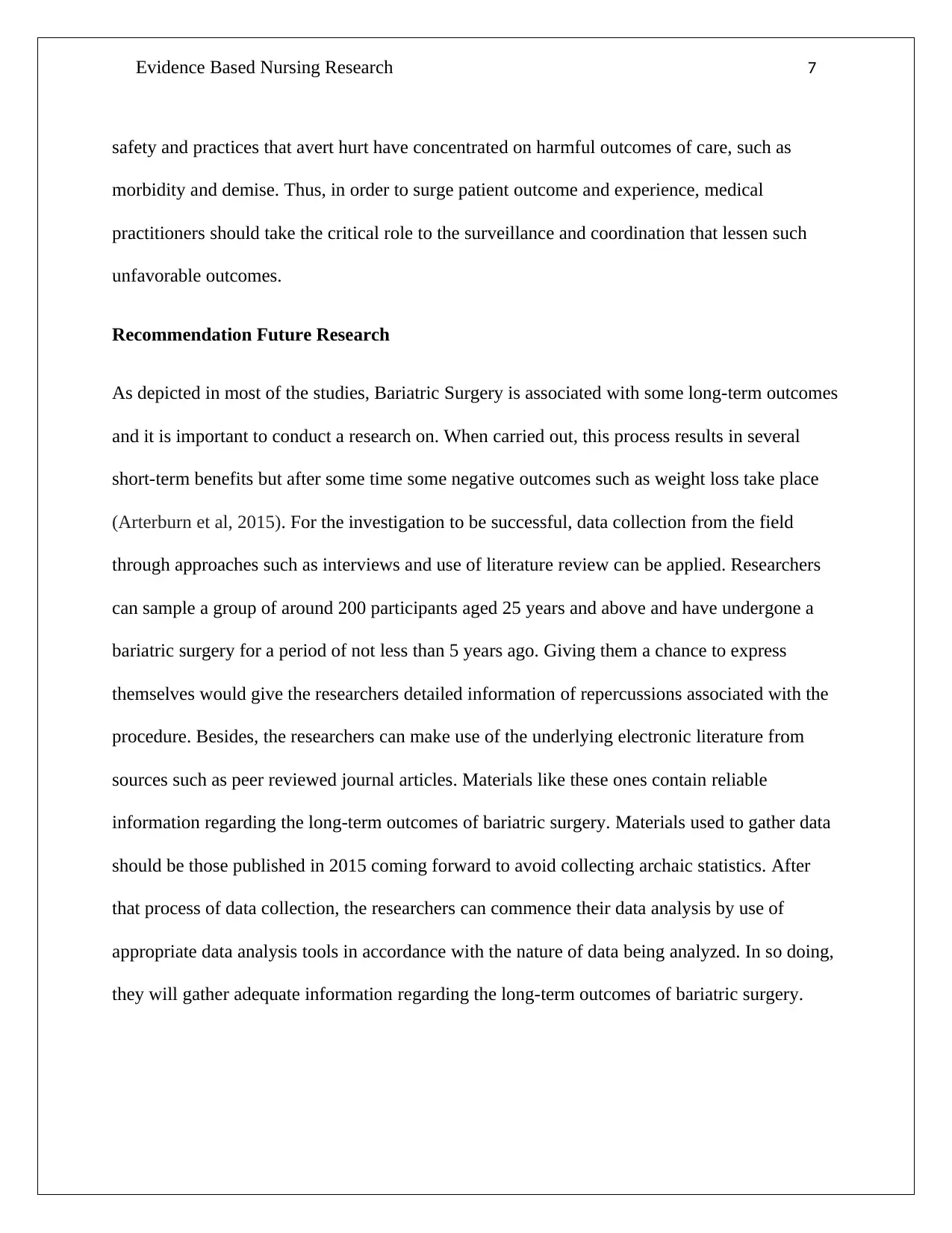
Evidence Based Nursing Research 7
safety and practices that avert hurt have concentrated on harmful outcomes of care, such as
morbidity and demise. Thus, in order to surge patient outcome and experience, medical
practitioners should take the critical role to the surveillance and coordination that lessen such
unfavorable outcomes.
Recommendation Future Research
As depicted in most of the studies, Bariatric Surgery is associated with some long-term outcomes
and it is important to conduct a research on. When carried out, this process results in several
short-term benefits but after some time some negative outcomes such as weight loss take place
(Arterburn et al, 2015). For the investigation to be successful, data collection from the field
through approaches such as interviews and use of literature review can be applied. Researchers
can sample a group of around 200 participants aged 25 years and above and have undergone a
bariatric surgery for a period of not less than 5 years ago. Giving them a chance to express
themselves would give the researchers detailed information of repercussions associated with the
procedure. Besides, the researchers can make use of the underlying electronic literature from
sources such as peer reviewed journal articles. Materials like these ones contain reliable
information regarding the long-term outcomes of bariatric surgery. Materials used to gather data
should be those published in 2015 coming forward to avoid collecting archaic statistics. After
that process of data collection, the researchers can commence their data analysis by use of
appropriate data analysis tools in accordance with the nature of data being analyzed. In so doing,
they will gather adequate information regarding the long-term outcomes of bariatric surgery.
safety and practices that avert hurt have concentrated on harmful outcomes of care, such as
morbidity and demise. Thus, in order to surge patient outcome and experience, medical
practitioners should take the critical role to the surveillance and coordination that lessen such
unfavorable outcomes.
Recommendation Future Research
As depicted in most of the studies, Bariatric Surgery is associated with some long-term outcomes
and it is important to conduct a research on. When carried out, this process results in several
short-term benefits but after some time some negative outcomes such as weight loss take place
(Arterburn et al, 2015). For the investigation to be successful, data collection from the field
through approaches such as interviews and use of literature review can be applied. Researchers
can sample a group of around 200 participants aged 25 years and above and have undergone a
bariatric surgery for a period of not less than 5 years ago. Giving them a chance to express
themselves would give the researchers detailed information of repercussions associated with the
procedure. Besides, the researchers can make use of the underlying electronic literature from
sources such as peer reviewed journal articles. Materials like these ones contain reliable
information regarding the long-term outcomes of bariatric surgery. Materials used to gather data
should be those published in 2015 coming forward to avoid collecting archaic statistics. After
that process of data collection, the researchers can commence their data analysis by use of
appropriate data analysis tools in accordance with the nature of data being analyzed. In so doing,
they will gather adequate information regarding the long-term outcomes of bariatric surgery.
Paraphrase This Document
Need a fresh take? Get an instant paraphrase of this document with our AI Paraphraser
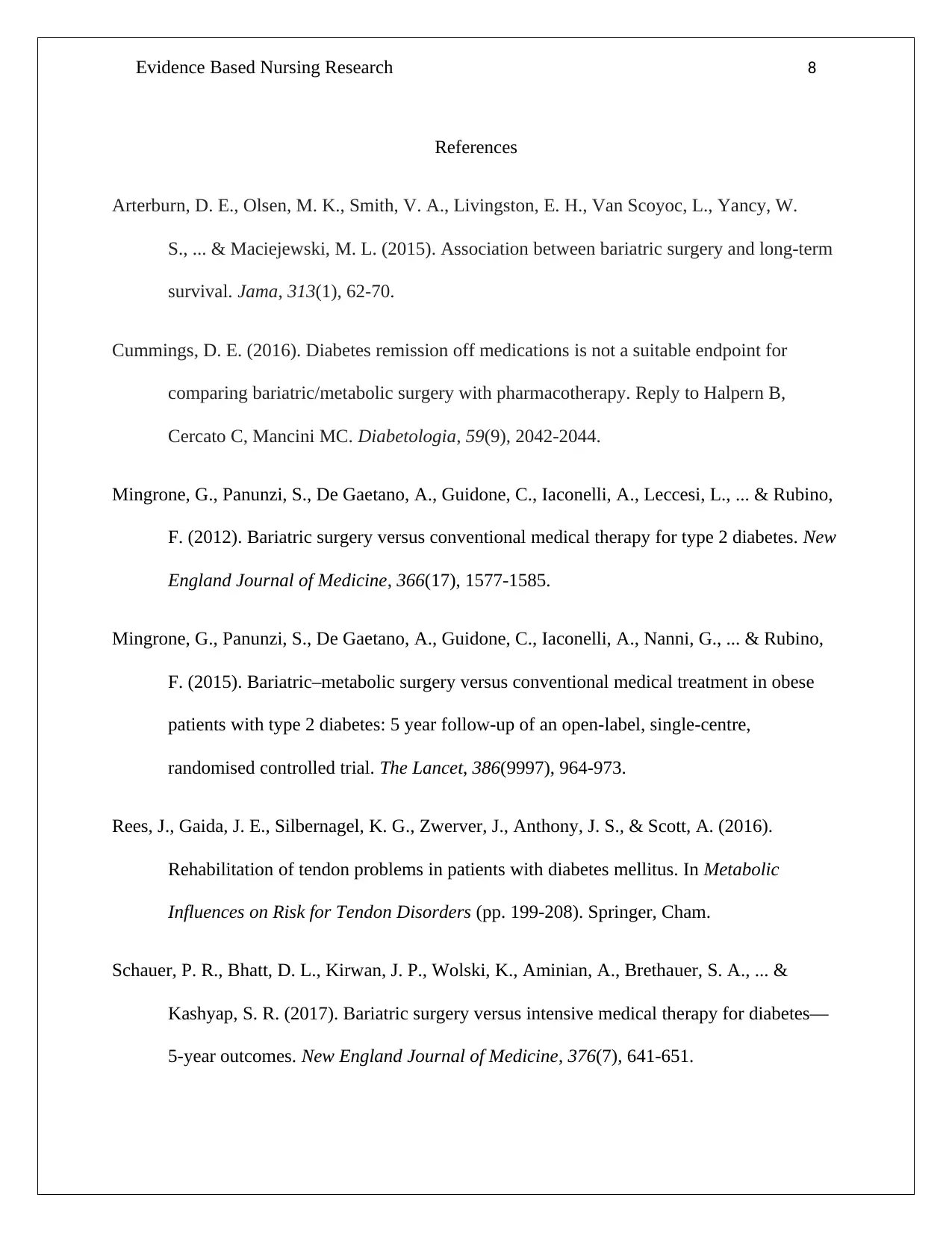
Evidence Based Nursing Research 8
References
Arterburn, D. E., Olsen, M. K., Smith, V. A., Livingston, E. H., Van Scoyoc, L., Yancy, W.
S., ... & Maciejewski, M. L. (2015). Association between bariatric surgery and long-term
survival. Jama, 313(1), 62-70.
Cummings, D. E. (2016). Diabetes remission off medications is not a suitable endpoint for
comparing bariatric/metabolic surgery with pharmacotherapy. Reply to Halpern B,
Cercato C, Mancini MC. Diabetologia, 59(9), 2042-2044.
Mingrone, G., Panunzi, S., De Gaetano, A., Guidone, C., Iaconelli, A., Leccesi, L., ... & Rubino,
F. (2012). Bariatric surgery versus conventional medical therapy for type 2 diabetes. New
England Journal of Medicine, 366(17), 1577-1585.
Mingrone, G., Panunzi, S., De Gaetano, A., Guidone, C., Iaconelli, A., Nanni, G., ... & Rubino,
F. (2015). Bariatric–metabolic surgery versus conventional medical treatment in obese
patients with type 2 diabetes: 5 year follow-up of an open-label, single-centre,
randomised controlled trial. The Lancet, 386(9997), 964-973.
Rees, J., Gaida, J. E., Silbernagel, K. G., Zwerver, J., Anthony, J. S., & Scott, A. (2016).
Rehabilitation of tendon problems in patients with diabetes mellitus. In Metabolic
Influences on Risk for Tendon Disorders (pp. 199-208). Springer, Cham.
Schauer, P. R., Bhatt, D. L., Kirwan, J. P., Wolski, K., Aminian, A., Brethauer, S. A., ... &
Kashyap, S. R. (2017). Bariatric surgery versus intensive medical therapy for diabetes—
5-year outcomes. New England Journal of Medicine, 376(7), 641-651.
References
Arterburn, D. E., Olsen, M. K., Smith, V. A., Livingston, E. H., Van Scoyoc, L., Yancy, W.
S., ... & Maciejewski, M. L. (2015). Association between bariatric surgery and long-term
survival. Jama, 313(1), 62-70.
Cummings, D. E. (2016). Diabetes remission off medications is not a suitable endpoint for
comparing bariatric/metabolic surgery with pharmacotherapy. Reply to Halpern B,
Cercato C, Mancini MC. Diabetologia, 59(9), 2042-2044.
Mingrone, G., Panunzi, S., De Gaetano, A., Guidone, C., Iaconelli, A., Leccesi, L., ... & Rubino,
F. (2012). Bariatric surgery versus conventional medical therapy for type 2 diabetes. New
England Journal of Medicine, 366(17), 1577-1585.
Mingrone, G., Panunzi, S., De Gaetano, A., Guidone, C., Iaconelli, A., Nanni, G., ... & Rubino,
F. (2015). Bariatric–metabolic surgery versus conventional medical treatment in obese
patients with type 2 diabetes: 5 year follow-up of an open-label, single-centre,
randomised controlled trial. The Lancet, 386(9997), 964-973.
Rees, J., Gaida, J. E., Silbernagel, K. G., Zwerver, J., Anthony, J. S., & Scott, A. (2016).
Rehabilitation of tendon problems in patients with diabetes mellitus. In Metabolic
Influences on Risk for Tendon Disorders (pp. 199-208). Springer, Cham.
Schauer, P. R., Bhatt, D. L., Kirwan, J. P., Wolski, K., Aminian, A., Brethauer, S. A., ... &
Kashyap, S. R. (2017). Bariatric surgery versus intensive medical therapy for diabetes—
5-year outcomes. New England Journal of Medicine, 376(7), 641-651.
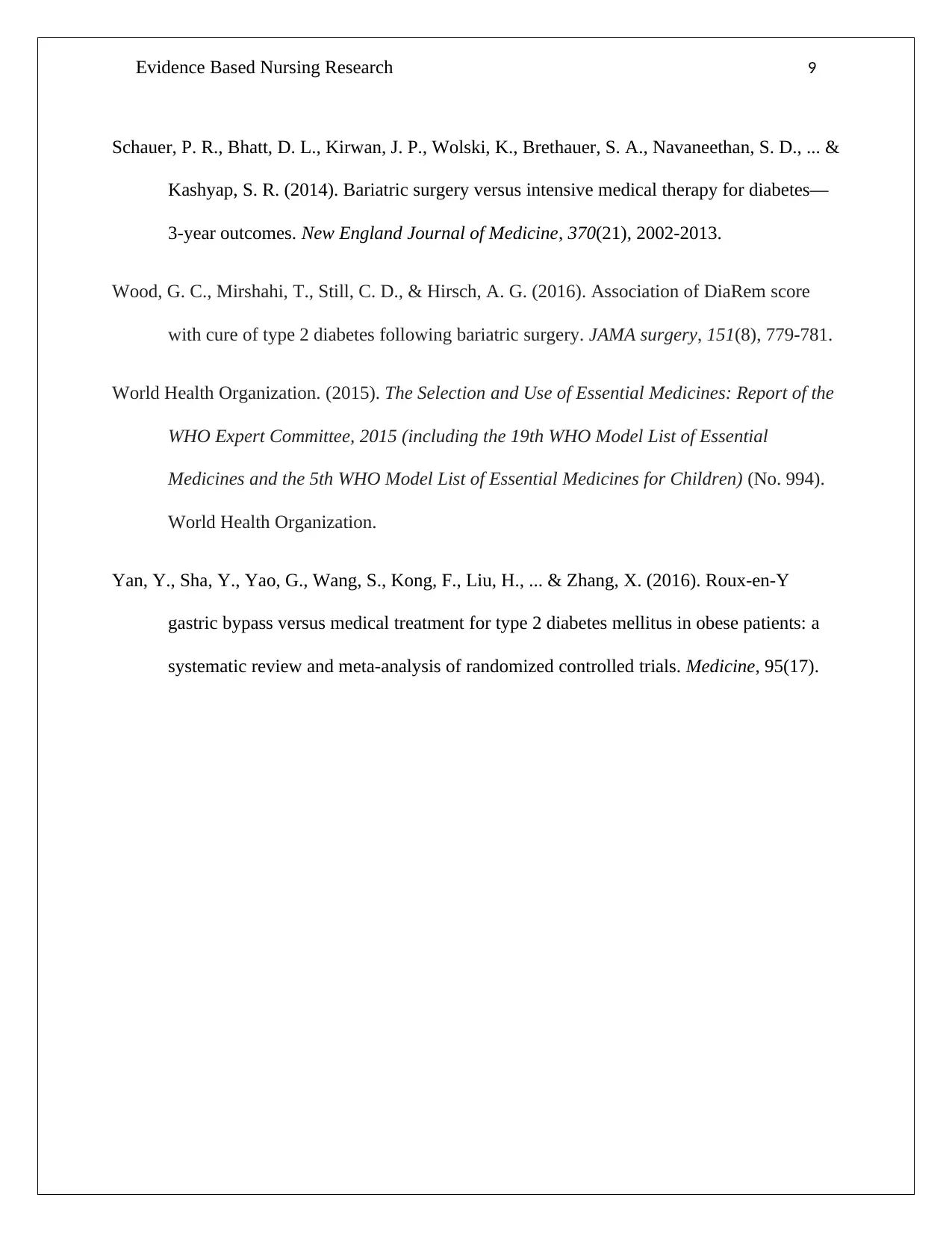
Evidence Based Nursing Research 9
Schauer, P. R., Bhatt, D. L., Kirwan, J. P., Wolski, K., Brethauer, S. A., Navaneethan, S. D., ... &
Kashyap, S. R. (2014). Bariatric surgery versus intensive medical therapy for diabetes—
3-year outcomes. New England Journal of Medicine, 370(21), 2002-2013.
Wood, G. C., Mirshahi, T., Still, C. D., & Hirsch, A. G. (2016). Association of DiaRem score
with cure of type 2 diabetes following bariatric surgery. JAMA surgery, 151(8), 779-781.
World Health Organization. (2015). The Selection and Use of Essential Medicines: Report of the
WHO Expert Committee, 2015 (including the 19th WHO Model List of Essential
Medicines and the 5th WHO Model List of Essential Medicines for Children) (No. 994).
World Health Organization.
Yan, Y., Sha, Y., Yao, G., Wang, S., Kong, F., Liu, H., ... & Zhang, X. (2016). Roux-en-Y
gastric bypass versus medical treatment for type 2 diabetes mellitus in obese patients: a
systematic review and meta-analysis of randomized controlled trials. Medicine, 95(17).
Schauer, P. R., Bhatt, D. L., Kirwan, J. P., Wolski, K., Brethauer, S. A., Navaneethan, S. D., ... &
Kashyap, S. R. (2014). Bariatric surgery versus intensive medical therapy for diabetes—
3-year outcomes. New England Journal of Medicine, 370(21), 2002-2013.
Wood, G. C., Mirshahi, T., Still, C. D., & Hirsch, A. G. (2016). Association of DiaRem score
with cure of type 2 diabetes following bariatric surgery. JAMA surgery, 151(8), 779-781.
World Health Organization. (2015). The Selection and Use of Essential Medicines: Report of the
WHO Expert Committee, 2015 (including the 19th WHO Model List of Essential
Medicines and the 5th WHO Model List of Essential Medicines for Children) (No. 994).
World Health Organization.
Yan, Y., Sha, Y., Yao, G., Wang, S., Kong, F., Liu, H., ... & Zhang, X. (2016). Roux-en-Y
gastric bypass versus medical treatment for type 2 diabetes mellitus in obese patients: a
systematic review and meta-analysis of randomized controlled trials. Medicine, 95(17).
⊘ This is a preview!⊘
Do you want full access?
Subscribe today to unlock all pages.

Trusted by 1+ million students worldwide
1 out of 9
Related Documents
Your All-in-One AI-Powered Toolkit for Academic Success.
+13062052269
info@desklib.com
Available 24*7 on WhatsApp / Email
![[object Object]](/_next/static/media/star-bottom.7253800d.svg)
Unlock your academic potential
Copyright © 2020–2025 A2Z Services. All Rights Reserved. Developed and managed by ZUCOL.





